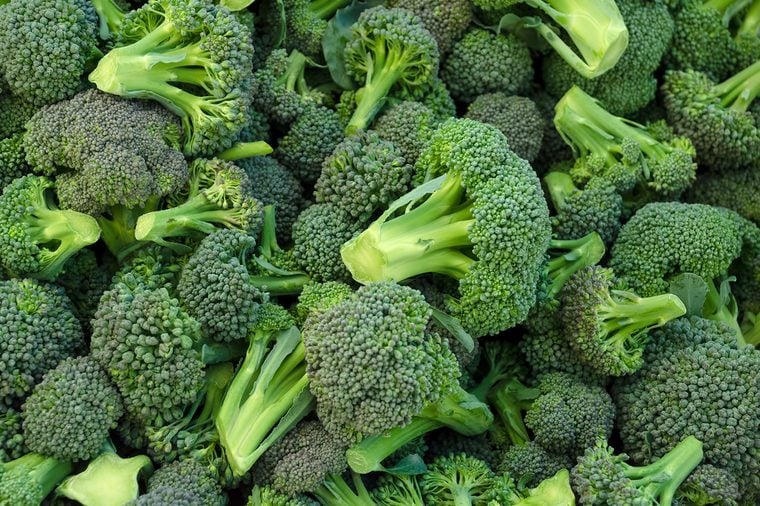
Broccoli
First off, it’s worth highlighting that most people don’t even come close to getting as many vegetables as they should in their daily diet, so don’t use this as an excuse to avoid the greens you need. Think of this warning as inspiration to eat the rainbow when it comes to your vegetables. “Broccoli is a superfood that is packed with potent antioxidants known to reduce the risk of cancer and heart disease, but when eaten in very large amounts, broccoli may lead to hypothyroidism (low thyroid),” say the Nutrition Twins, Lyssie Lakatos, RDN, CDN, CFT, and Tammy Lakatos Shames, RDN, CDN, CFT, authors of The Nutrition Twins’ Veggie Cure. “This is because they contain thiocyanates, which can make it difficult for your body to absorb iodine. If you’re someone who has dealt with thyroid issues in the past, be sure not to consume very large amounts of broccoli.” In moderation, though, find out what broccoli can do for your blood sugar.
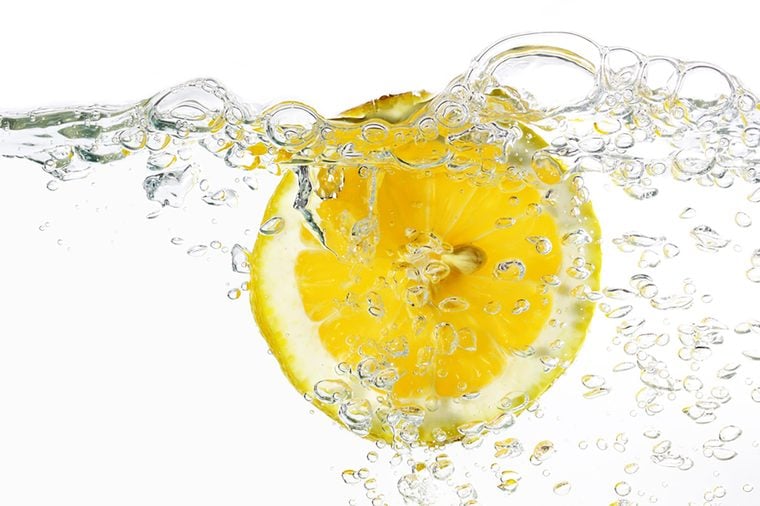
Lemon water
The list of health experts and fitness influencers who swear by their morning lemon water is seemingly infinite. “It’s a very low-calorie, low-sugar beverage that encourages drinking,” explain The Nutrition Twins. “It helps you stay hydrated with its fresh flavor while also providing some immune-boosting vitamin C and antioxidants that may help to protect your cells from damage. However, if you drink a lot of lemon water, the acid from the lemon stays on your teeth and can damage your tooth enamel, which makes your teeth prone to cavities.” If you do drink a lot of lemon water, the twins recommend rinsing your mouth afterward and drinking with a straw to minimize contact with your teeth. Here are 12 more potential reasons to love lemon water.
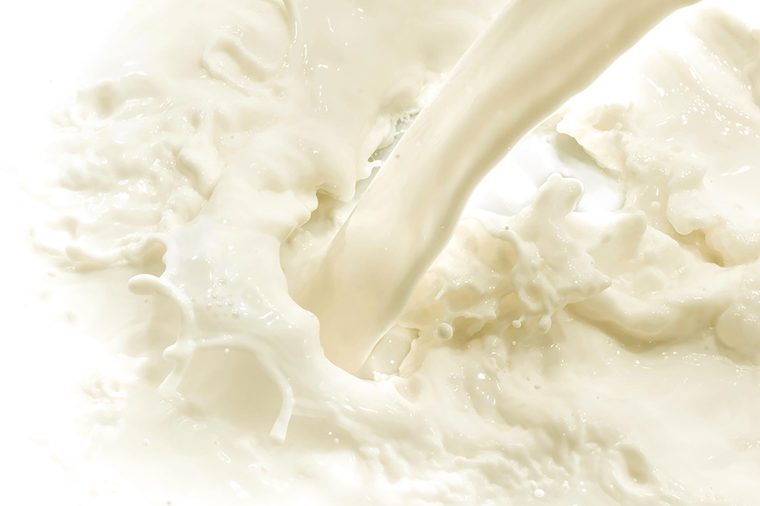
Almond and plant-based milk
The problem with cow milk alternatives, such as almond, oat, hemp, soy, coconut, and rice milks, is that they’re often very processed and have lots of added sugars. In fact, these plant-based milks usually have little of the actual plant, says Keith-Thomas Ayoob, EdD, RD, FAND, associate clinical professor at Albert Einstein College of Medicine. “A glass of the average almond milk, for example, only has about four almonds,” he says. Here’s why you should stop giving your kids nondairy milks.
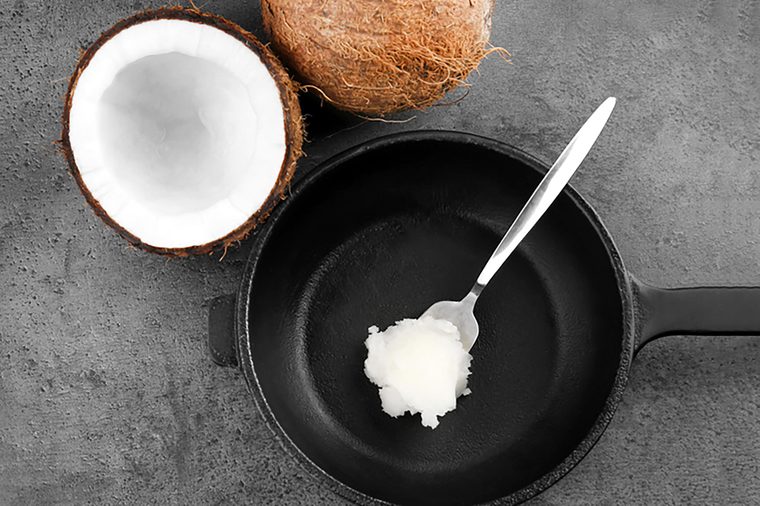
Coconut oil
“More accurately, coconut fat at room temperature is solid owing to its near-total saturated fat content,” says Ayoob. Contrary to coconut oil’s popularity among the foodie glitterati, there’s no actual science to suggest coconut oil is healthy, he says. “Go for extra-virgin olive oil, or canola, grape-seed, or other unsaturated oils as a healthier alternative. And watch out for portion size: No matter the type of oil you’re using, they all have lots of calories, so use them sparingly,” Ayoob warns. Check out these other compelling reasons to avoid cooking with coconut oil.
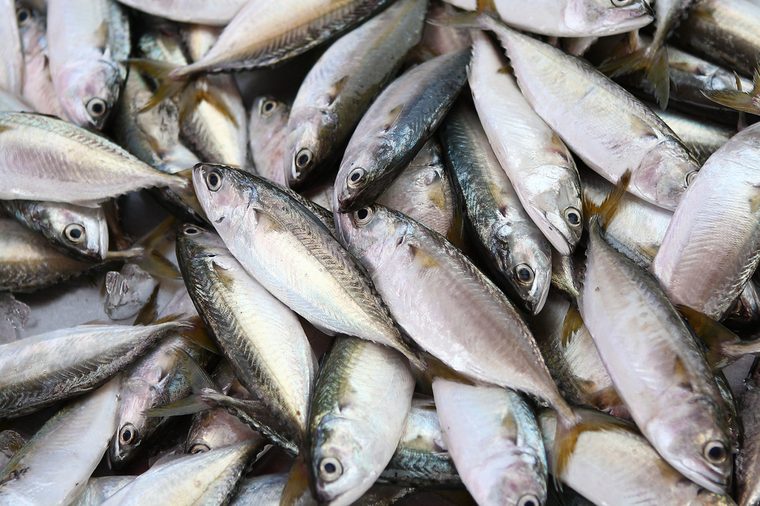
Tuna fish
Tuna is a versatile and inexpensive source of protein, magnesium, zinc, iron, and omega-3 fatty acids. “If, however, you’re choosing solid albacore or tuna steaks several times a week, you’re likely getting too much mercury, which is a neurotoxin,” say the Nutrition Twins. “Mercury poisoning can lead to muscle weakness and vision changes.” To avoid any danger, they recommend for the light tuna instead of albacore if you eat tuna regularly. “Pregnant women and children are advised to choose the lowest mercury-containing fish and limit their intake to no more than two times per week.” Here’s a guide to the best fish to eat (and which to avoid).
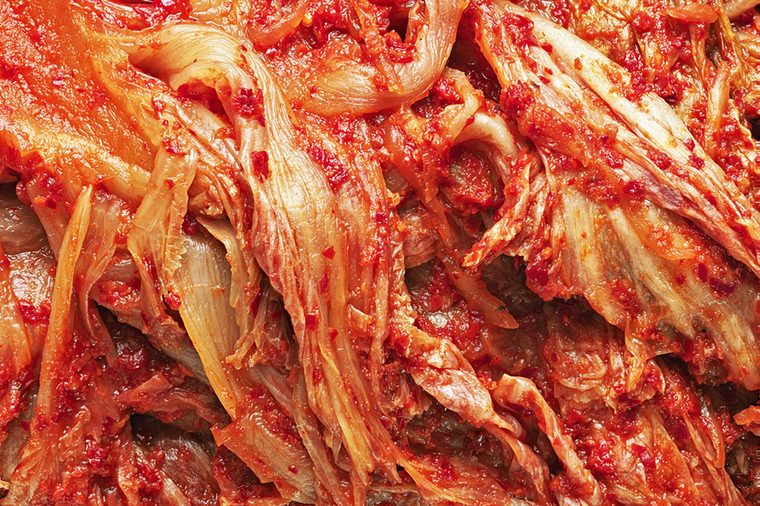
Kimchi
Kimchi—a type of pickled cabbage—is a good source of vitamin A, vitamin C, and gut-healthy prebiotic fiber, say the Nutrition Twins. Plus, the kick of flavor is a tasty way to eat your veggies. But it also happens to be high in sodium—the 670 milligrams in a single 100-gram serving translates to almost a third of your recommended maximum sodium intake, they warn. “Combining a few servings of kimchi with the foods you eat in your day and you’ll go well beyond the sodium limit, increasing your risk of developing high blood pressure and congestive heart failure,” the twins say. That said, kimchi makes the list of 15 foods that nutritionists try to eat every day—in moderation!
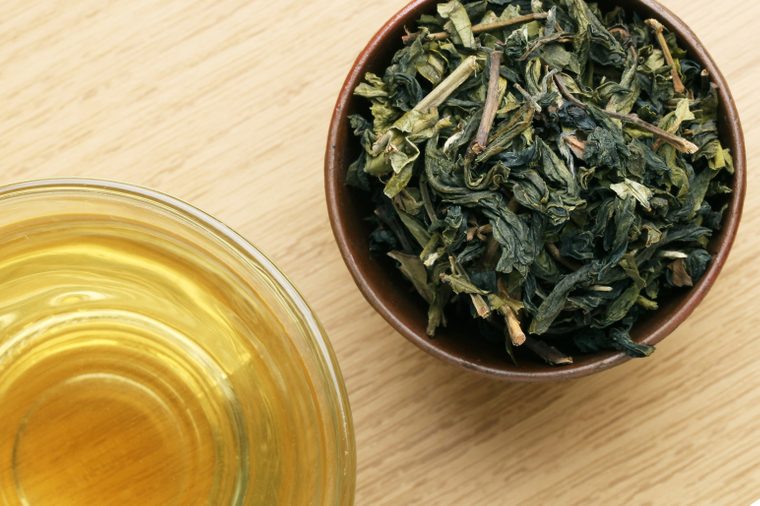
Green tea
Most people can drink green tea with no worries: “It’s packed with catechins, powerful antioxidants that help fend off cancer, inflammation, and heart disease,” say the Nutrition Twins. “However, the tannins found in green tea can also interfere with the absorption of non-heme iron (iron from plant-based sources), so if you have low iron levels or are at risk for iron deficiency (some athletes, elderly, pregnant women, and vegetarians who don’t consume enough iron) avoid drinking green tea with meals and just drink it between them.” Look out for these silent signs of an iron deficiency.
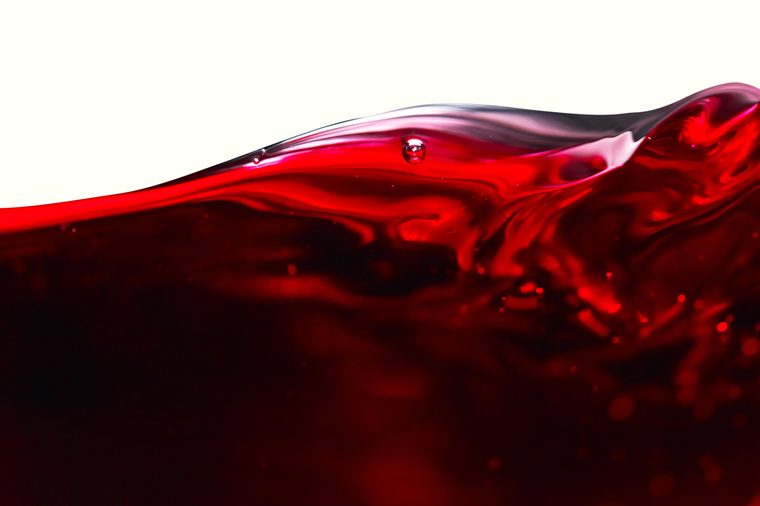
Red wine
Red wine can help boost wellness, but the dose is key. “Red wine can be heart healthy and part of a healthful Mediterranean diet, in modest amounts,” says Ayoob. “A modest amount is defined as one five-ounce glass per day for women, two glasses for men.” Just don’t plan on going dry six days out of the week so that you can guzzle half a dozen glasses of wine on Saturday night. “It’s use ’em or lose ’em,” says Ayoob. “No saving them up for a big blast on the weekend.” And he warns that booze of any kind doesn’t mix well with many medications; check with your doctor about the safety of wine with your prescriptions. Learn what happens to your body when you drink a glass of red wine every day.
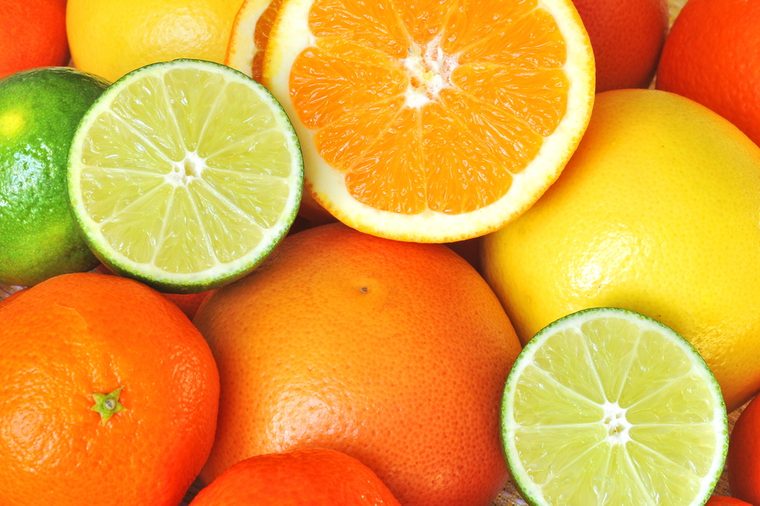
Grapefruit and some other citrus fruits
While citrus fruits are healthy for most people, Ayoob points out that grapefruit, tangelos, minneolas, pummelos, and more can interfere with a long list of medications, including some statins and antihistamines. “Interaction varies with the medication, but can result in very high blood levels of the drug, or sometimes decreased absorption of the drug, when taken within 72 hours of consuming these citrus fruits.” If you’re taking medication, always check with your doctor or pharmacist to make sure you can safely consume citrus fruits. Find out which other 17 “healthy” foods can actually be bad for you.
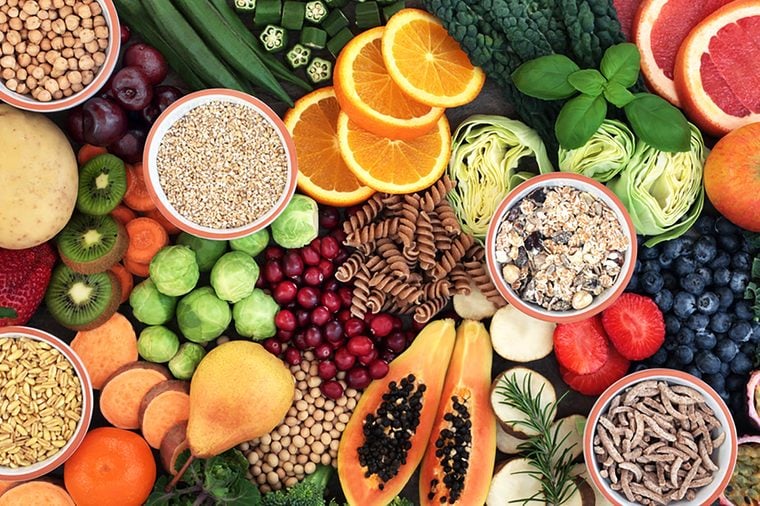
High-fiber foods
When it comes to weight loss, fiber—the part of a carbohydrate your body can’t digest—is incredibly important. It swells in the stomach to make you feel fuller longer, meaning you can lose weight without hunger. However, if you’re not used to plenty of fiber in your diet, eating too much at once can cause gas and bloating. “This is typical but annoying and can be socially awkward,” says Ayoob. “You really need to introduce fiber gradually and consistently if you’re used to a low-fiber diet.” Find out what happens to your body when you start eating more fiber.
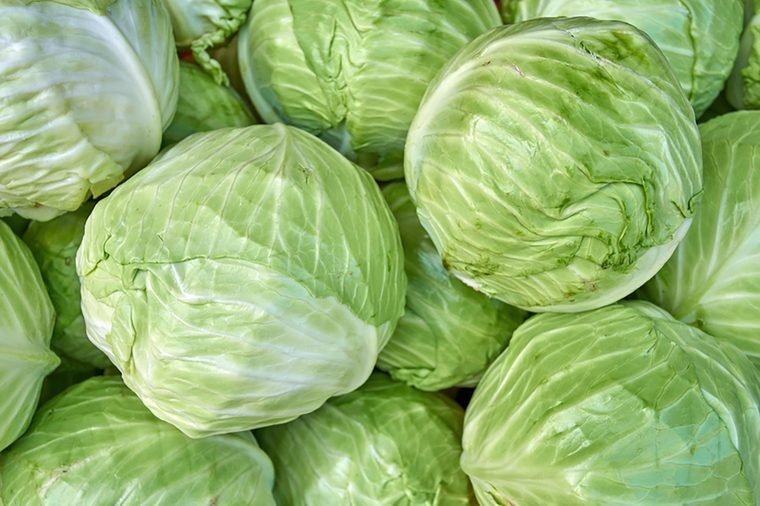
Cabbage, kale, Brussels sprouts
“These are great foods with tons of antioxidants, minerals, and vitamins,” says Ayoob. “The problem for people on blood-thinning medications, like warfarin, is that they’re high in vitamin K, a nutrient that helps blood to clot.” (Here are 17 more medication mistakes that could make you sick.) Unless you’re at high risk for blood clots, though, the vegetables are good for you.
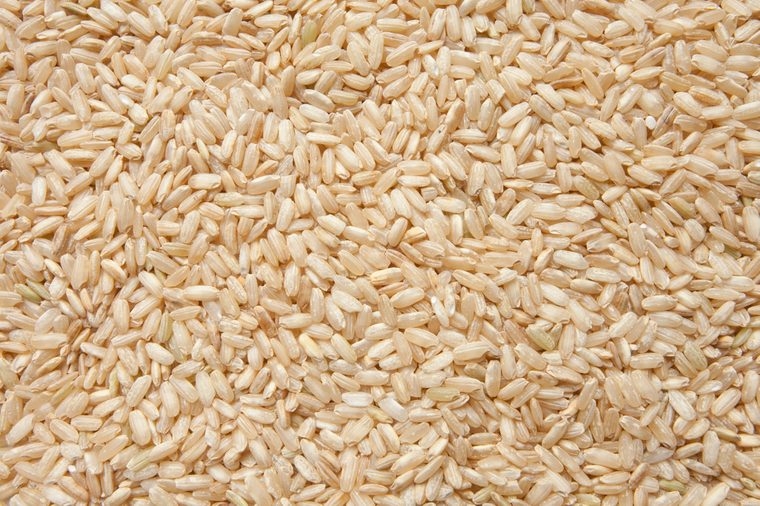
Brown rice
While brown rice can be a source of whole grains, it may have higher levels of inorganic arsenic, depending on where it’s grown. “Arsenic is present in water and soil and as a result of polluted runoff that can drain into groundwater,” explains Maya Feller, MS, RD, CDN, CLC. “This, in turn, increases the arsenic content of water in some areas where brown rice is grown. Issues arise with frequent and consistent exposure; thus, eating brown rice and products with brown rice derivatives every day can result in higher exposure to arsenic.” She advises rinsing your brown rice and varying the type of grains you eat. Don’t miss these other high-carb foods that could kill you.
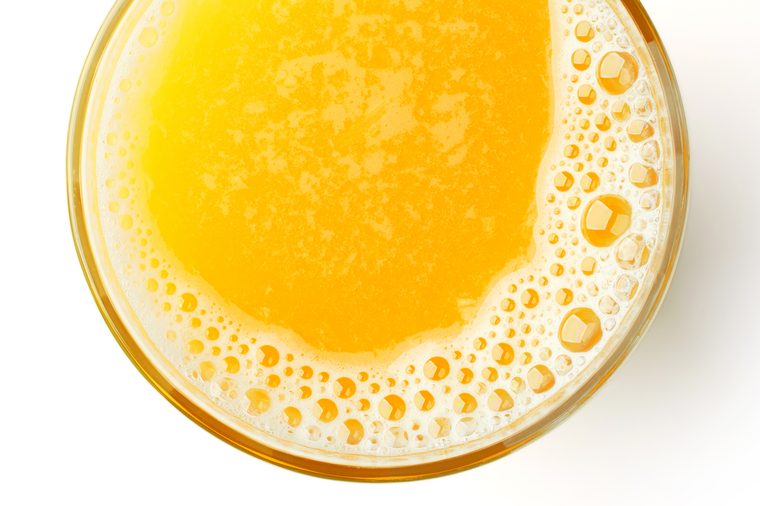
Juices
You might think drinking juice is just like eating fresh whole fruits, but juices are mostly sugar and they don’t have any of the belly-filling fiber you get when you eat real fruit. “Consumers are often confused about this and feel that having juice on a regular basis is a healthy choice,” says Feller. “The solution, skip the juice and have the whole fruit.” Check out these other 13 healthy swaps that will cut your sugar intake.
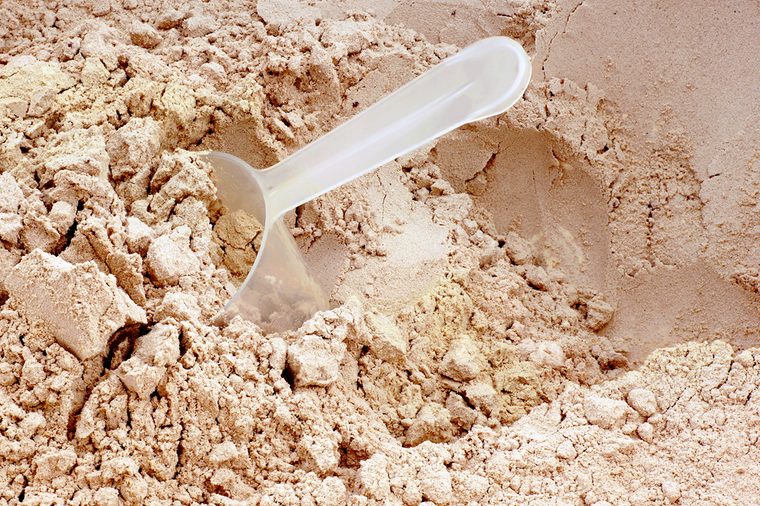
Protein powder
Protein is vital for both losing weight and building lean muscle. The average healthy person needs about 1.75 grams of protein per pound of body weight, depending on age, physical activity level, and other health-related variables, says Feller. Does this mean the average person should start to take a protein powder supplement as a part of their daily routine? “I would advise not,” she says. “Most of us can meet our protein needs by following a healthy balanced diet. Excessive protein intake can strain the kidneys.” Also, some supplements may be contaminated with heavy metals. Feller recommends that you “get clear guidance from a credentialed professional around protein supplementation.” Watch out for these silent signs you’re eating too much protein.
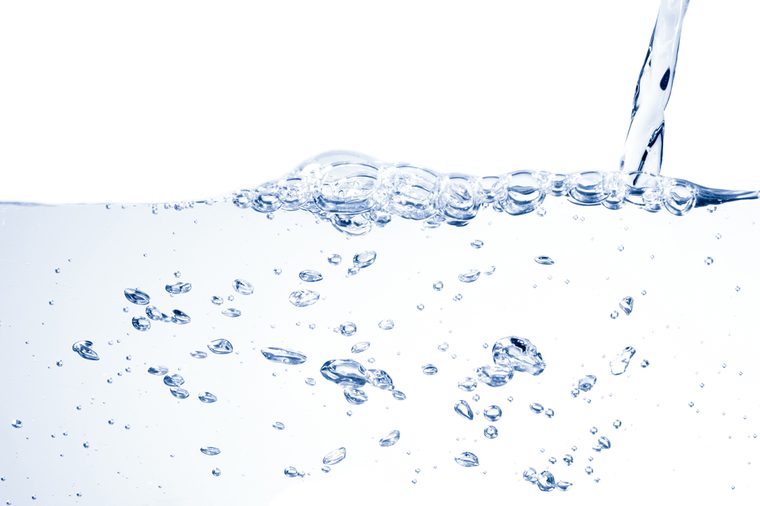
Water
We all need plenty of water—and most Americans don’t get enough. In fact, we often confuse our thirst for hunger, warns Feller. “However the other side of the coin is over-hydration,” says Feller. “Drinking too much water over a short period of time can disturb electrolyte imbalance and in turn result in dangerously low sodium levels.” That said, this usually only occurs, she says, if someone drinks gallons of water over a short period of time. Learn the silent signs that you’re drinking too much water.
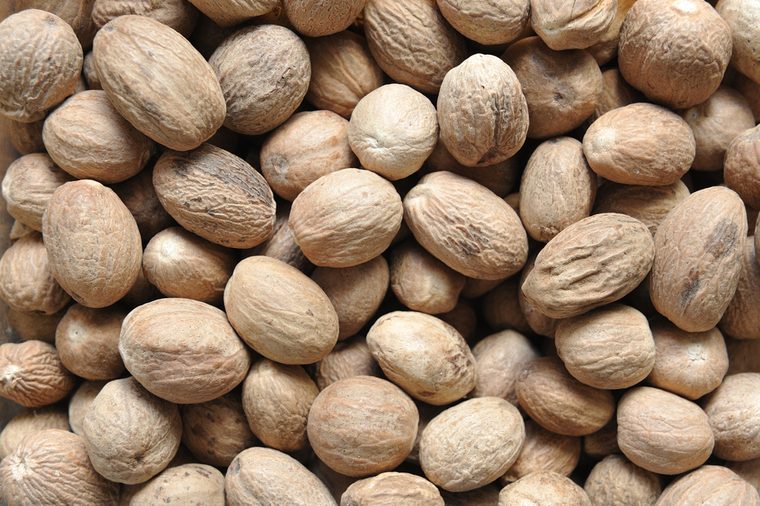
Nutmeg
Spices are a healthy, low-calorie alternative to heavy sauces and condiments. But a little goes a long way when it comes to adding flavor. “I’m a huge fan of spices—I just wrote a book on their health benefits,” says Melina B. Jampolis, MD, author of Spice Up, Slim Down, and founder of SpiceFit. “They’re loaded with antioxidant and anti-inflammatory compounds, but in the case of nutmeg, consuming excessive amounts may have a hallucinatory effect and can lead to nutmeg poisoning due to one of the active chemicals in the seeds called myristicin.” If you overdo it, you could experience intense nausea, dizziness, and extreme dry mouth. But you’d need to eat at least a tablespoon before you were at risk of any of those effects, so putting a dash in your eggnog or adding a teaspoon to a recipe is totally safe, says Dr. Jampolis.
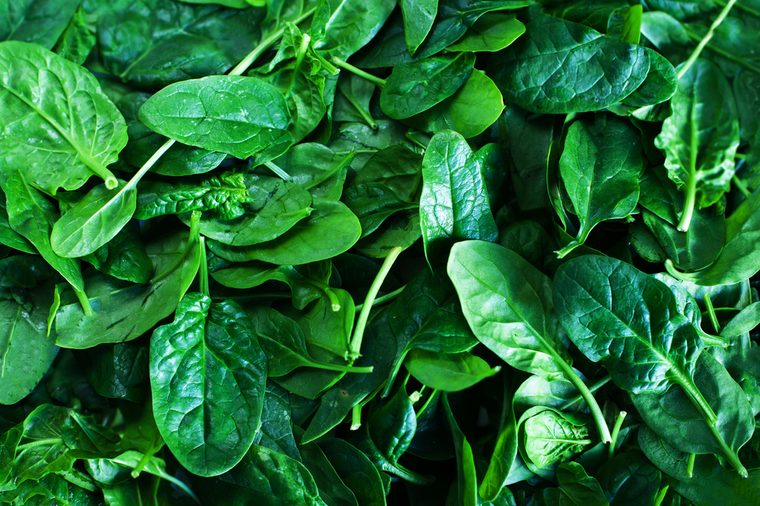
Spinach
Before you cut out Popeye’s fuel, remember that most people don’t get nearly enough leafy greens, including spinach, in their diet. “This is unfortunate because leafy greens are a terrific low-calorie source of vitamins and minerals including magnesium, lutein, folic acid, and vitamin K,” says Dr. Jampolis. “But for people with the most common type of kidney stones, calcium oxalate, too much spinach could be problematic, as it contains high levels of oxalate, which could lead to kidney stones in those at risk.” Don’t miss these other everyday mistakes that put your kidneys in trouble.
